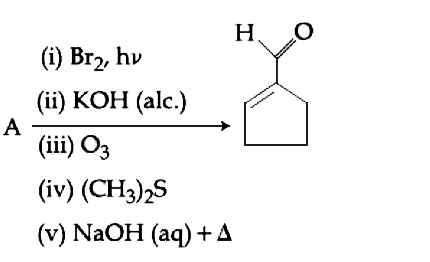The following reaction is

A
nucleophilic substitution
B
electrophilic substitution
C
free radical sbstitution
D
electrophilic addition
Text Solution
The correct Answer is:A
Although benzene does not undergo nucleophilic substituion, nitrobenzene undergoes such reaction due to the presence of electron withdrawing −NO2 group which makes o - and p - carbon electron deficient and hence liable to be attacked by OH− (a nucleophile).
|
Topper's Solved these Questions
- AMINESBOOK - DISHA PUBLICATIONCHAPTER - AMINESEXERCISE - Exercise - 1 : Concept Builder (Topicwise)(TOPIC - 3 : Concept Applicator)
13 Videos
- ALDEHYDES, KETONES AND CARBOXYLIC ACIDSBOOK - DISHA PUBLICATIONCHAPTER - ALDEHYDES, KETONES AND CARBOXYLIC ACIDSEXERCISE - Exercise - 2 : Concept Applicator
27 Videos
- BIOMOLECULES BOOK - DISHA PUBLICATIONCHAPTER - BIOMOLECULES EXERCISE - Exercise - 2 : Concept Applicator
30 Videos
Similar Questions
Knowledge Check
Which of the following reactions is a decomposition reaction ?
AHCl + NaOH → NaCl + H2OBZn+CuSO4→ZnSO4+CuC2HgOΔ−−→2Hg+O2DCO2+H2O→H2CO3Which of the following reactions is a synthesis reaction?
AWhen steam is passed over red hot coke, a mixture of carbon monoxide and hydrogen is formed.BSodium reacts with water to form sodium hydroxide and hydrogen.CWhen the milk of lime (calcium hydroxide) is added to hot sodium carbonate solution, sodium hydroxide is obtained and calcium carbonate separates out as mud.DStannic chloride is prepared by passing chlorine into molten tin.Which of the following reactions is a synthesis reaction?
AWhen steam is passed over red hot coke, a mixture of carbon monoxide and hydrogen 15 fomed .BSodium reacts with water co form sodium hydroxide and hydrogen .CWhen the milk of lime (calcium hydroxide) is added to hot sodium carbonate solution, sodium hydroxide is obtained and calcium carbonate separates out as mud.DStannic chloride is perpared by passing chlorine into molten tin.

